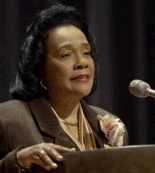This Day in Black History: Coretta Scott King is Born
Share
Explore Our Galleries
Breaking News!
Today's news and culture by Black and other reporters in the Black and mainstream media.
Ways to Support ABHM?
From Who’s Who of American Women
Coretta Scott King was born on this date in 1927. She was an African-American civil rights activist and author.
From Heiberger, Alabama, Coretta Scott was the daughter of Bernice McMurry Scott, a housewife, and Obadiah Scott, a lumber carrier. Scott grew up walking three miles each day to school while school buses carrying white children drove by her. Such occurrences, while difficult, led her to strive for equality and the best for herself. Scott went on to graduate from high school and in 1945 entered Antioch College in Yellow Springs, Ohio on a scholarship.
Majoring in Education and Music, Scott became alarmed when she was not able to teach in a public school because she was Black. At this time she became involved with Civil Right groups, joined the Antioch chapter of the NAACP, the college’s Race Relations Committee, and Civil Liberties Committees. In 1951, she accepted a scholarship to continue her musical training at the New England Conservatory in Boston before finishing her degree from Antioch College. Upon her arrival in Boston, she met her future husband, Martin Luther King Jr., a young minister who was studying for his Ph.D. at Boston University.
On June 18, 1953, Martin Luther King Sr. married his son, Martin Luther King Jr. and Coretta Scott. They returned to the South to work on the civil liberties of Black Americans. By 1964, King was the mother of four children: Yolanda, Martin Luther King III, Dexter Scott, and Bernice Albertine. She had also become active with the Southern Christian Leadership Conference. Although usually at her husband’s side, she made solo appearances at various civil rights functions that her husband could not attend. She also performed at benefit concerts by lecturing and even singing to the audience. On April 4, 1968, her husband was shot and killed while giving a speech on a hotel balcony.
Read more about Coretta Scott King here.
Discover more activists in our online exhibits.
More breaking news here.












Comments Are Welcome
Note: We moderate submissions in order to create a space for meaningful dialogue, a space where museum visitors – adults and youth –– can exchange informed, thoughtful, and relevant comments that add value to our exhibits.
Racial slurs, personal attacks, obscenity, profanity, and SHOUTING do not meet the above standard. Such comments are posted in the exhibit Hateful Speech. Commercial promotions, impersonations, and incoherent comments likewise fail to meet our goals, so will not be posted. Submissions longer than 120 words will be shortened.
See our full Comments Policy here.